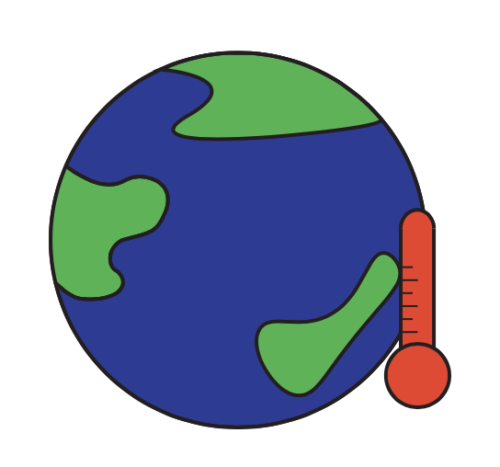
design: Natalia Favila Inacua
The weather has been changing drastically around the world: it’s snowing in areas where the temperature is usually mild, there are many droughts and wild fires occurring and the ice caps in the arctic are melting rapidly. All these changes are direct impacts of global warming and are threatening wildlife.
As global warming continues to become a more prominent issue throughout the world, increasing numbers of people are more environmentally conscious by being mindful of how their actions impact the earth. Preserving the planet for future generations has been something that people have been moving towards for a long time, but it is becoming more of an urgent matter.
The high school has always had recycling bins to reduce the amount of waste, which in turn helps the environment by preserving resources. The bins were collected regularly before and the intervention department was in charge of the task.
“For the past several years, our students have been recycling classroom paper as a job and to help our environment,” Intervention Aide Mary Turon said. “It is a wonderful opportunity to go into the greater school community and learn teamwork and management skills.”
However, recently, the recycling program at the school was stopped, and many students and teachers are wondering why this significant change was made. The pandemic was the reason behind this, as it caused the school’s recycling company to shut down.
“Unfortunately during the pandemic, our recycling company, Abi Bow Paper Recycling, went out of business,” Turon said. “It was only after a dozen phone calls to maintenance, custodians, building secretaries that I learned we no longer had a recycling company under contract.”
Global warming is a pressing catastrophe, and the planet is changing as a consequence of human habits. The release of harmful chemicals in the air due to current lifestyles is one of the major practices that contribute to this climate crisis.
“Our combustion of fossil fuels for transportation and the shipping of materials is largely what is contributing to our excessive release of greenhouse gases (such as Carbon Dioxide),” AP Environmental Science teacher Jessica Timmons said.
The dietary habits of humans also contribute to climate change, as producing meat releases abundant amounts of methane into the atmosphere. Additionally, people tend to throw out all the food they don’t consume, leading to overflowing landfills.
“Our meat-based diets contribute to massive amounts of the greenhouse gas methane to be emitted, which is 10x stronger at retaining heat compared to carbon dioxide; methane is released through anaerobic respiration in the stomachs of ruminant animals,” Timmons said. “Methane is also released from landfills, as the organic material that we throw away decomposes.”
Human activities producing greenhouse gasses such as carbon dioxide and methane bring forth a wide variety of repercussions leading to the downfall of the planet, and as a whole, these changes in the environment are defined as global warming.
“Greenhouse gasses cause heat to get trapped in our atmosphere and not get radiated off into space, which causes our planet to heat up,” junior and Secretary of Environmental Club Alex Johnson said. “When the planet heats up, it melts ice caps, causes droughts and can cause deadly wildfires.”
As mentioned before, though, there are changes humans can implement into their lives to reduce the footprint they have on the environment. Reducing the amount of waste they produce on a day-to-day basis, by recycling, composting, or just buying less, is one of the most beneficial ways they can help the environment.
“Biggest thing you can do is buy less stuff,” Timmons said. “If everyone took a moment to consider all of the processes that it took to manufacture the item that they were buying, as well as consider the amount of fossil fuels it took to transport that item (and the pieces that make up that item), we would produce a whole heck of a lot less waste.”
Because recycling benefits the environment in such a significant way, some teachers have been collecting items to recycle even if there aren’t any bins in classrooms currently.
“Several teachers collect aluminum cans and paper independently and take recycling home to recycle,” Turon said.


